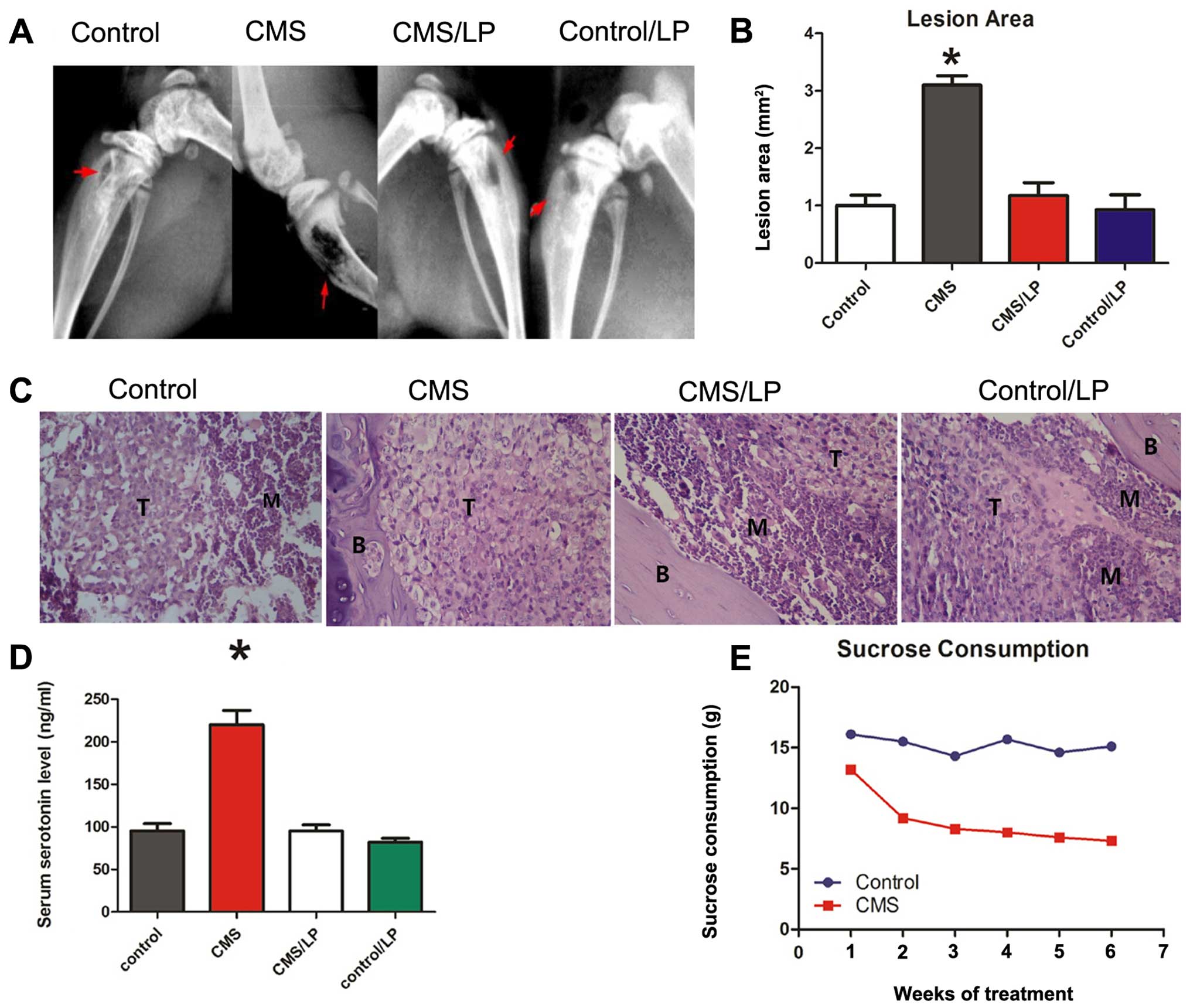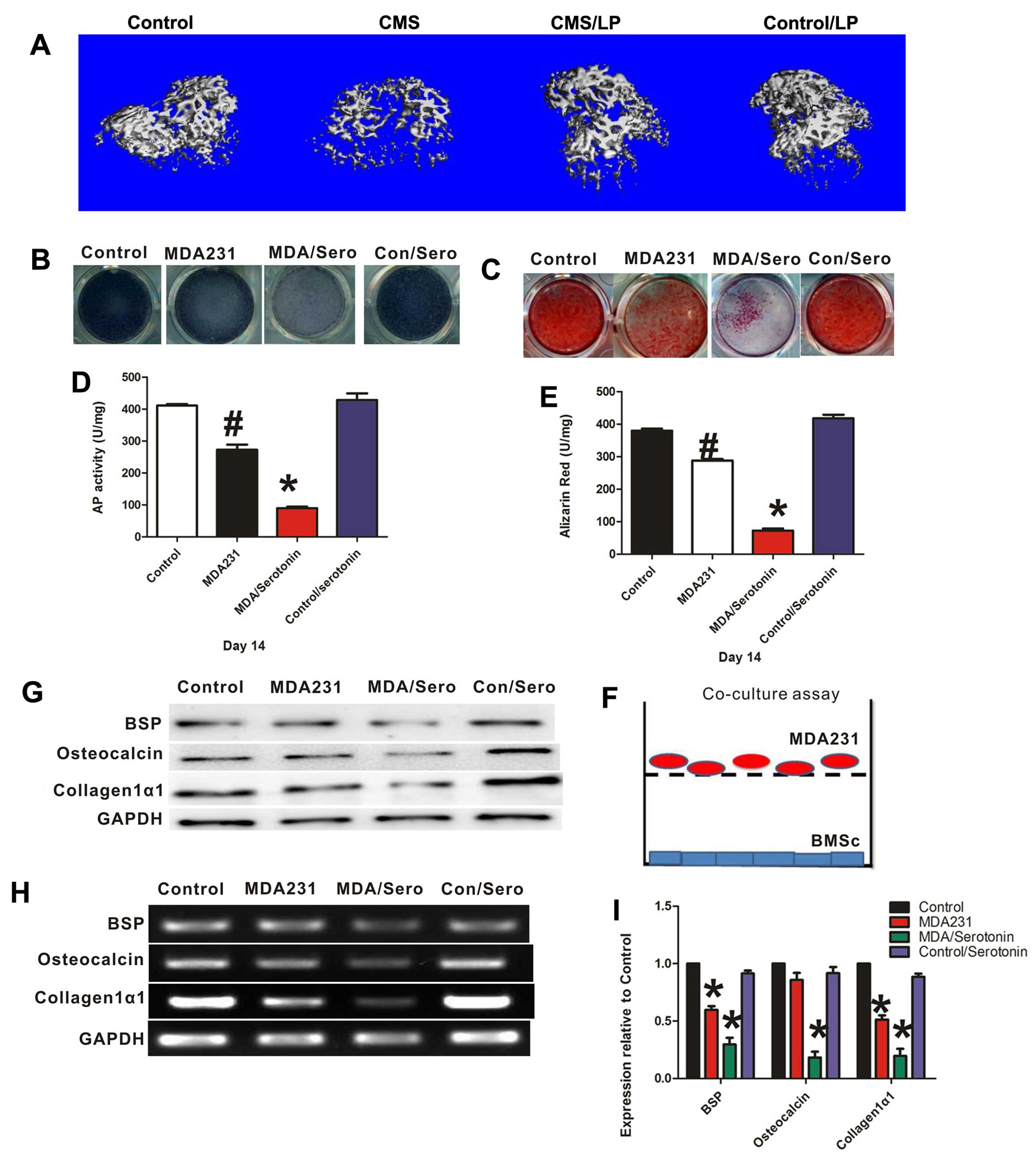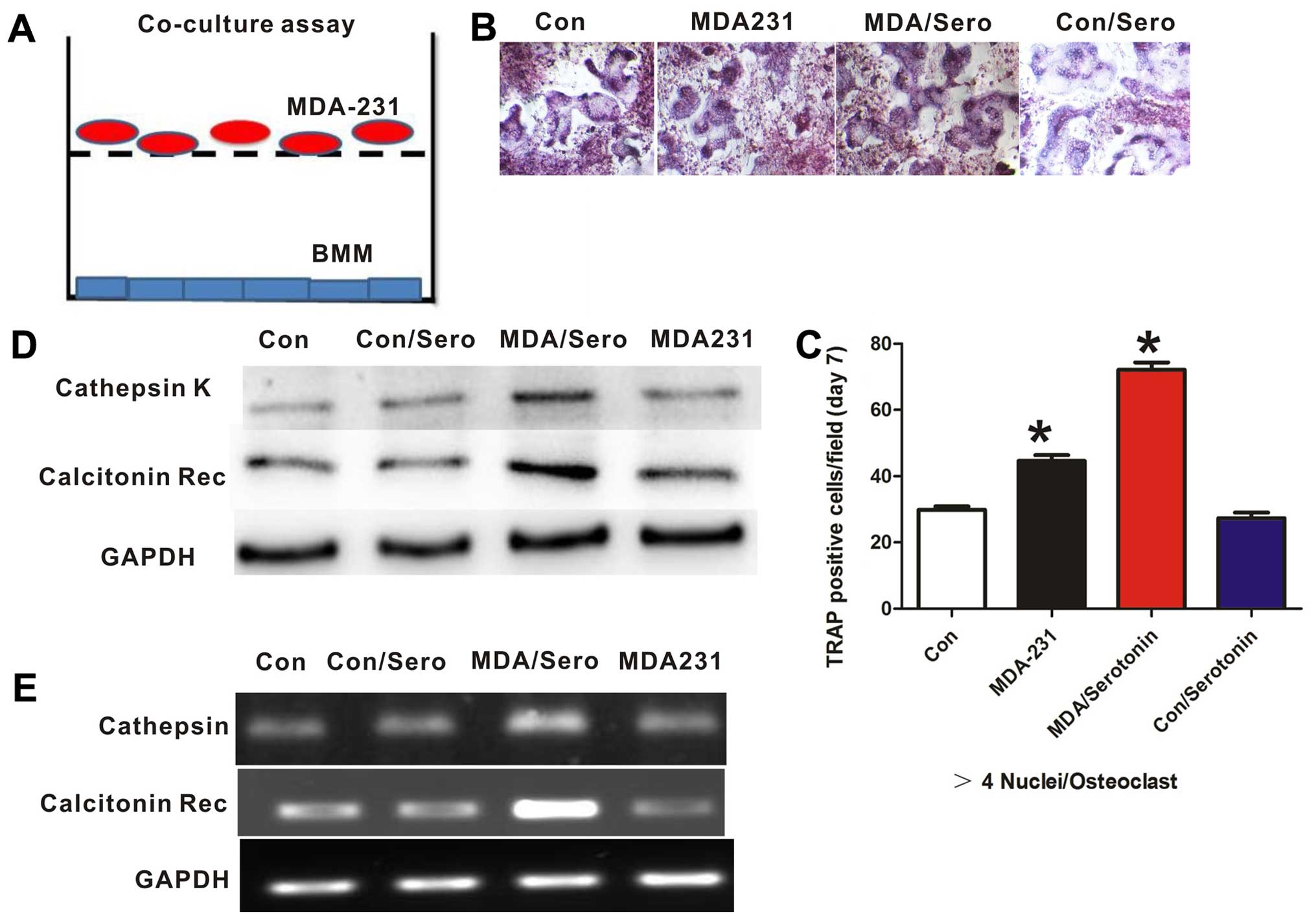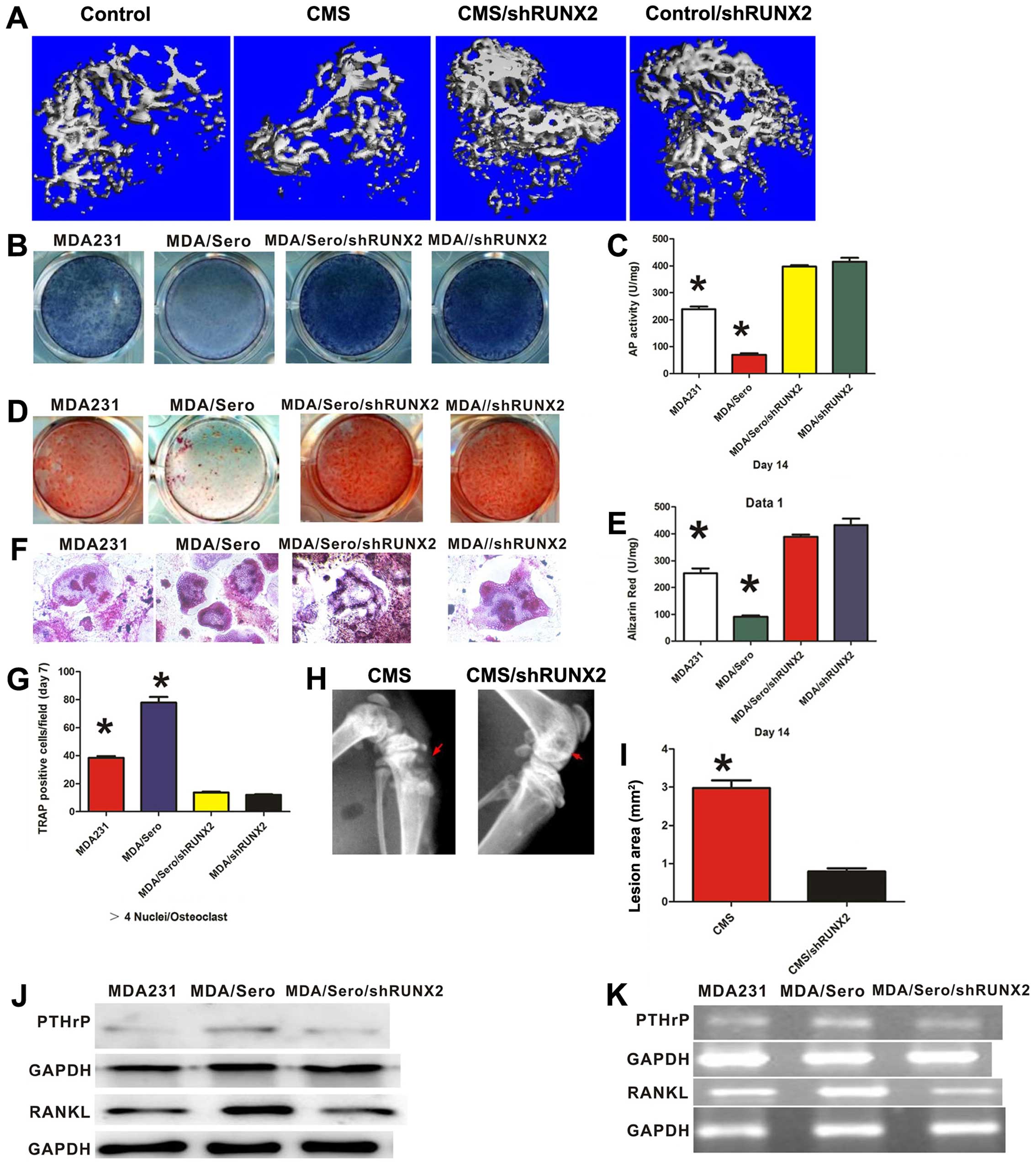|
1
|
Feng X and McDonald JM: Disorders of bone
remodeling. Annu Rev Pathol. 6:121–145. 2011. View Article : Google Scholar
|
|
2
|
Henriksen K, Bollerslev J, Everts V and
Karsdal MA: Osteoclast activity and subtypes as a function of
physiology and pathology - implications for future treatments of
osteoporosis. Endocr Rev. 32:31–63. 2011. View Article : Google Scholar
|
|
3
|
Khosla S, Westendorf JJ and Oursler MJ:
Building bone to reverse osteoporosis and repair fractures. J Clin
Invest. 118:421–428. 2008. View
Article : Google Scholar : PubMed/NCBI
|
|
4
|
Novack DV and Teitelbaum SL: The
osteoclast: Friend or foe? Annu Rev Pathol. 3:457–484. 2008.
View Article : Google Scholar
|
|
5
|
Raggatt LJ and Partridge NC: Cellular and
molecular mechanisms of bone remodeling. J Biol Chem.
285:25103–25108. 2010. View Article : Google Scholar : PubMed/NCBI
|
|
6
|
Zaidi M: Skeletal remodeling in health and
disease. Nat Med. 13:791–801. 2007. View
Article : Google Scholar : PubMed/NCBI
|
|
7
|
Waning DL and Guise TA: Molecular
mechanisms of bone metastasis and associated muscle weakness. Clin
Cancer Res. 20:3071–3077. 2014. View Article : Google Scholar : PubMed/NCBI
|
|
8
|
Lipton A: Implications of bone metastases
and the benefits of bone-targeted therapy. Semin Oncol. 37(Suppl
2): S15–S29. 2010. View Article : Google Scholar : PubMed/NCBI
|
|
9
|
Tonyali O, Arslan C and Altundag K: The
role of zoledronic acid in the adjuvant treatment of breast cancer:
Current perspectives. Expert Opin Pharmacother. 11:2715–2725. 2010.
View Article : Google Scholar : PubMed/NCBI
|
|
10
|
Tonello L and Cocchi M: The cell membrane:
Is it a bridge from psychiatry to quantum consciousness?
Neuroquantology. 8:54–60. 2010. View Article : Google Scholar
|
|
11
|
Cocchi M and Tonello L: Bio molecular
considerations in major depression and ischemic cardiovascular
disease. Cent Nerv Syst Agents Med Chem. 10:97–107. 2010.
View Article : Google Scholar : PubMed/NCBI
|
|
12
|
Cocchi M, Tonello L, De Lucia A and Amato
P: Platelet and brain fatty acids: A model for the classifcation of
the animals? Part 1. Int J Anthropol. 24:69–76. 2009.
|
|
13
|
Cocchi M, Tonello L, De Lucia A and Amato
P: Platelet and brain fatty acids: A model for the classification
of the animals? Part 2. Platelet and brain fatty acid transfer:
Hypothesis on arachidonic acid and its relationship to major
depression. Int J Anthropol. 24:201–220. 2009.
|
|
14
|
Heron DS, Shinitzky M, Hershkowitz M and
Samuel D: Lipid fluidity markedly modulates the binding of
serotonin to mouse brain membranes. Proc Natl Acad Sci USA.
77:7463–7467. 1980. View Article : Google Scholar : PubMed/NCBI
|
|
15
|
Bab IA and Yirmiya R: Depression and bone
mass. Ann NY Acad Sci. 1192:170–175. 2010. View Article : Google Scholar : PubMed/NCBI
|
|
16
|
Darmon MC, Guibert B, Leviel V, Ehret M,
Maitre M and Mallet J: Sequence of two mRNAs encoding active rat
tryptophan hydroxylase. J Neurochem. 51:312–316. 1988. View Article : Google Scholar : PubMed/NCBI
|
|
17
|
Walther DJ, Peter JU, Bashammakh S,
Hörtnagl H, Voits M, Fink H and Bader M: Synthesis of serotonin by
a second tryptophan hydroxylase isoform. Science. 299(76)2003.
View Article : Google Scholar
|
|
18
|
Yadav VK, Ryu JH, Suda N, Tanaka KF,
Gingrich JA, Schütz G, Glorieux FH, Chiang CY, Zajac JD, Insogna
KL, et al: Lrp5 controls bone formation by inhibiting serotonin
synthesis in the duodenum. Cell. 135:825–837. 2008. View Article : Google Scholar : PubMed/NCBI
|
|
19
|
Haney EM and Warden SJ: Skeletal effects
of serotonin (5-hydroxytryptamine) transporter inhibition: Evidence
from clinical studies. J Musculoskelet Neuronal Interact.
8:133–145. 2008.PubMed/NCBI
|
|
20
|
Rosen CJ: Bone remodeling, energy
metabolism, and the molecular clock. Cell Metab. 7:7–10. 2008.
View Article : Google Scholar : PubMed/NCBI
|
|
21
|
Kopparapu PK, Tinzl M, Anagnostaki L,
Persson JL and Dizeyi N: Expression and localization of serotonin
receptors in human breast cancer. Anticancer Res. 33:363–370.
2013.PubMed/NCBI
|
|
22
|
Hernandez LL, Gregerson KA and Horseman
ND: Mammary gland serotonin regulates parathyroid hormone-related
protein and other bone-related signals. Am J Physiol Endocrinol
Metab. 302:E1009–E1015. 2012. View Article : Google Scholar : PubMed/NCBI
|
|
23
|
Horseman ND and Hernandez LL: New concepts
of breast cell communication to bone. Trends Endocrinol Metab.
25:34–41. 2014. View Article : Google Scholar
|
|
24
|
Johnson RW, Nguyen MP, Padalecki SS,
Grubbs BG, Merkel AR, Oyajobi BO, Matrisian LM, Mundy GR and
Sterling JA: TGF-beta promotion of Gli2-induced expression of
parathyroid hormone-related protein, an important osteolytic factor
in bone metastasis, is independent of canonical Hedgehog signaling.
Cancer Res. 71:822–831. 2011. View Article : Google Scholar :
|
|
25
|
Guise TA, Yin JJ, Taylor SD, Kumagai Y,
Dallas M, Boyce BF, Yoneda T and Mundy GR: Evidence for a causal
role of parathyroid hormone-related protein in the pathogenesis of
human breast cancer-mediated osteolysis. J Clin Invest.
98:1544–1549. 1996. View Article : Google Scholar : PubMed/NCBI
|
|
26
|
Liu R, Dang W, Jianting M, Su C, Wang H,
Chen Y and Tan Q: Citalopram alleviates chronic stress induced
depression-like behaviors in rats by activating GSK3β signaling in
dorsal hippo-campus. Brain Res. 1467:10–17. 2012. View Article : Google Scholar : PubMed/NCBI
|
|
27
|
Zhao Y, Wang Z, Dai J, Chen L, Huang Y and
Zhan Z: Beneficial effects of benzodiazepine diazepam on chronic
stress-induced impairment of hippocampal structural plasticity and
depression-like behavior in mice. Behav Brain Res. 228:339–350.
2012. View Article : Google Scholar
|
|
28
|
Conway CC, Hammen C, Brennan PA, Lind PA
and Najman JM: Interaction of chronic stress with serotonin
transporter and catechol-O-methyltransferase polymorphisms in
predicting youth depression. Depress Anxiety. 27:737–745.
2010.PubMed/NCBI
|
|
29
|
Liu Q, Yang Q, Sun W, Vogel P, Heydorn W,
Yu XQ, Hu Z, Yu W, Jonas B, Pineda R, et al: Discovery and
characterization of novel tryptophan hydroxylase inhibitors that
selectively inhibit serotonin synthesis in the gastrointestinal
tract. J Pharmacol Exp Ther. 325:47–55. 2008. View Article : Google Scholar : PubMed/NCBI
|
|
30
|
Satin JR, Linden W and Phillips MJ:
Depression as a predictor of disease progression and mortality in
cancer patients: A meta-analysis. Cancer. 115:5349–5361. 2009.
View Article : Google Scholar : PubMed/NCBI
|
|
31
|
Pinquart M and Duberstein PR: Depression
and cancer mortality: A meta-analysis. Psychol Med. 40:1797–1810.
2010. View Article : Google Scholar : PubMed/NCBI
|
|
32
|
Vodermaier A, Linden W, Rnic K, Young SN,
Ng A, Ditsch N and Olson R: Prospective associations of depression
with survival: A population-based cohort study in patients with
newly diagnosed breast cancer. Breast Cancer Res Treat.
143:373–384. 2014. View Article : Google Scholar :
|
|
33
|
Yirmiya R and Bab I: Major depression is a
risk factor for low bone mineral density: A meta-analysis. Biol
Psychiatry. 66:423–432. 2009. View Article : Google Scholar : PubMed/NCBI
|
|
34
|
Yadav VK and Ducy P: Lrp5 and bone
formation: A serotonin-dependent pathway. Ann NY Acad Sci.
1192:103–109. 2010. View Article : Google Scholar
|
|
35
|
Kode A, Mosialou I, Silva BC, Rached MT,
Zhou B, Wang J, Townes TM, Hen R, DePinho RA, Guo XE, et al: FOXO1
orchestrates the bone-suppressing function of gut-derived
serotonin. J Clin Invest. 122:3490–3503. 2012. View Article : Google Scholar : PubMed/NCBI
|
|
36
|
Rucci N and Teti A: Osteomimicry: How
tumor cells try to deceive the bone. Front Biosci (Schol Ed).
2:907–915. 2010. View
Article : Google Scholar
|
|
37
|
Standal T, Borset M and Sundan A: Role of
osteopontin in adhesion, migration, cell survival and bone
remodeling. Exp Oncol. 26:179–184. 2004.PubMed/NCBI
|
|
38
|
Marie PJ: Transcription factors
controlling osteoblastogenesis. Arch Biochem Biophys. 473:98–105.
2008. View Article : Google Scholar : PubMed/NCBI
|
|
39
|
Komori T, Yagi H, Nomura S, Yamaguchi A,
Sasaki K, Deguchi K, Shimizu Y, Bronson RT, Gao YH, Inada M, et al:
Targeted disruption of Cbfa1 results in a complete lack of bone
formation owing to maturational arrest of osteoblasts. Cell.
89:755–764. 1997. View Article : Google Scholar : PubMed/NCBI
|
|
40
|
Banerjee C, McCabe LR, Choi JY, Hiebert
SW, Stein JL, Stein GS and Lian JB: Runt homology domain proteins
in osteoblast differentiation: AML3/CBFA1 is a major component of a
bone-specific complex. J Cell Biochem. 66:1–8. 1997. View Article : Google Scholar : PubMed/NCBI
|
|
41
|
Mendoza-Villanueva D, Zeef L and Shore P:
Metastatic breast cancer cells inhibit osteoblast differentiation
through the Runx2/CBFβ-dependent expression of the Wnt antagonist,
sclerostin. Breast Cancer Res. 13:R1062011. View Article : Google Scholar
|
|
42
|
Pratap J, Wixted JJ, Gaur T, Zaidi SK,
Dobson J, Gokul KD, Hussain S, van Wijnen AJ, Stein JL, Stein GS,
et al: Runx2 transcriptional activation of Indian Hedgehog and a
downstream bone metastatic pathway in breast cancer cells. Cancer
Res. 68:7795–7802. 2008. View Article : Google Scholar : PubMed/NCBI
|
|
43
|
Javed A, Barnes GL, Pratap J, Antkowiak T,
Gerstenfeld LC, van Wijnen AJ, Stein JL, Lian JB and Stein GS:
Impaired intranuclear trafficking of Runx2 (AML3/CBFA1)
transcription factors in breast cancer cells inhibits osteolysis in
vivo. Proc Natl Acad Sci USA. 102:1454–1459. 2005. View Article : Google Scholar : PubMed/NCBI
|
|
44
|
Karaplis AC and Goltzman D: PTH and PTHrP
effects on the skeleton. Rev Endocr Metab Disord. 1:331–341. 2000.
View Article : Google Scholar
|
|
45
|
Kozlow W and Guise TA: Breast cancer
metastasis to bone: Mechanisms of osteolysis and implications for
therapy. J Mammary Gland Biol Neoplasia. 10:169–180. 2005.
View Article : Google Scholar : PubMed/NCBI
|
|
46
|
Mundy GR: Metastasis to bone: Causes,
consequences and therapeutic opportunities. Nat Rev Cancer.
2:584–593. 2002. View
Article : Google Scholar : PubMed/NCBI
|
|
47
|
Pratap J, Javed A, Languino LR, van Wijnen
AJ, Stein JL, Stein GS and Lian JB: The Runx2 osteogenic
transcription factor regulates matrix metalloproteinase 9 in bone
metastatic cancer cells and controls cell invasion. Mol Cell Biol.
25:8581–8591. 2005. View Article : Google Scholar : PubMed/NCBI
|


















